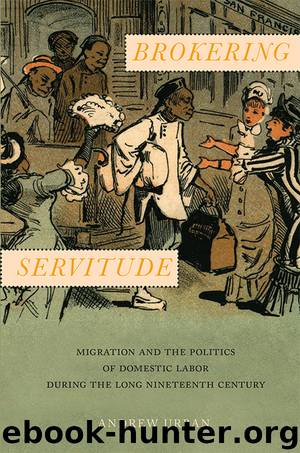Brokering Servitude by Andrew Urban

Author:Andrew Urban
Language: eng
Format: epub
Publisher: NYU Press
5
Bonded Chinese Servants
Domestic Labor and Exclusion, 1882–1924
Introduction
On October 15, 1919, Lieutenant Colonel W. Garland Fay arrived in Charleston, South Carolina, with “Ah” See, his Chinese servant. An officer in the Marine Corps, Fay had been stationed at the U.S. Naval Base in Guantánamo Bay, Cuba, which American forces had occupied since 1898 and would continue to hold indefinitely under the terms of the 1903 Cuban-American Treaty of Relations. The base at Guantánamo played a crucial support role backing U.S. imperial aspirations in the Caribbean, including as a coaling station for navy warships. The Marines stationed at Guantánamo were deployed to Haiti, to the Dominican Republic, and within Cuba, where they assisted the government in quelling local insurgencies that targeted American-backed sugar estates.1 Immigrants from Guangdong province in China had been arriving in Cuba since 1847, when they were first brought under contract to work on the sugar plantations. By the twentieth century, many Chinese immigrants and their descendants could be found working in service occupations, and the base at Guantánamo seems to have employed a number of Chinese laborers in this capacity.2 See’s father, Sing Lee, held a government concession to run a laundry business on the base. In 1915, at the age of fourteen, his son arrived at Guantánamo from China. When See was hired by Fay and his wife, he spoke no English. Four years later, he landed in the United States.3
As a Chinese laborer, See was ineligible to enter the United States. By 1919, however, the Bureau of Immigration had adopted a policy in which American military officials and white businessmen, missionaries, and academics living in China, Cuba, the Philippines, and Japan—and anywhere else where Chinese labor might be hired—were permitted to bring in Chinese servants as temporary, nonimmigrant entrants. Fay, prior to departing for Charleston, had corresponded with Anthony Caminetti, the commissioner general of immigration in Washington, who had responded with instructions on how to proceed. Caminetti informed Fay that he would be required to take out a five-hundred-dollar bond from a surety company, covering a period of one year.4 Before the year expired, See’s departure from the United States had to be witnessed and verified by immigration officials, at which time the bond would be canceled. If he did not depart within the stipulated period, the Fidelity and Deposit Company of Maryland, the issuer of the surety bond, would forfeit the full amount to the Department of Labor. If this happened, Fay, who up until then had paid the bond issuer only a percentage commission, would owe the company the remaining sum in its entirety.
Caminetti failed to communicate to Fay that although five hundred dollars was the standard bond required by officials and the minimum amount mandated by section 18 of the 1917 Immigration Act, individual officers at each port of entry had the discretion to set the amount on a case-by-case basis. When See was landed, officials in Charleston set the bond at a thousand dollars. As Fay would subsequently plead, he was so
Download
This site does not store any files on its server. We only index and link to content provided by other sites. Please contact the content providers to delete copyright contents if any and email us, we'll remove relevant links or contents immediately.
The Brazilian Economy since the Great Financial Crisis of 20072008 by Philip Arestis Carolina Troncoso Baltar & Daniela Magalhães Prates(118115)
International Integration of the Brazilian Economy by Elias C. Grivoyannis(87938)
The Art of Coaching by Elena Aguilar(52881)
Flexible Working by Dale Gemma;(23242)
How to Stop Living Paycheck to Paycheck by Avery Breyer(19620)
The Acquirer's Multiple: How the Billionaire Contrarians of Deep Value Beat the Market by Tobias Carlisle(12211)
Thinking, Fast and Slow by Kahneman Daniel(12019)
The Radium Girls by Kate Moore(11896)
The Art of Thinking Clearly by Rolf Dobelli(10172)
Hit Refresh by Satya Nadella(9013)
The Compound Effect by Darren Hardy(8781)
Tools of Titans by Timothy Ferriss(8181)
Atomic Habits: Tiny Changes, Remarkable Results by James Clear(8154)
Turbulence by E. J. Noyes(7918)
A Court of Wings and Ruin by Sarah J. Maas(7613)
Change Your Questions, Change Your Life by Marilee Adams(7607)
Nudge - Improving Decisions about Health, Wealth, and Happiness by Thaler Sunstein(7529)
How to Be a Bawse: A Guide to Conquering Life by Lilly Singh(7360)
Win Bigly by Scott Adams(7072)
